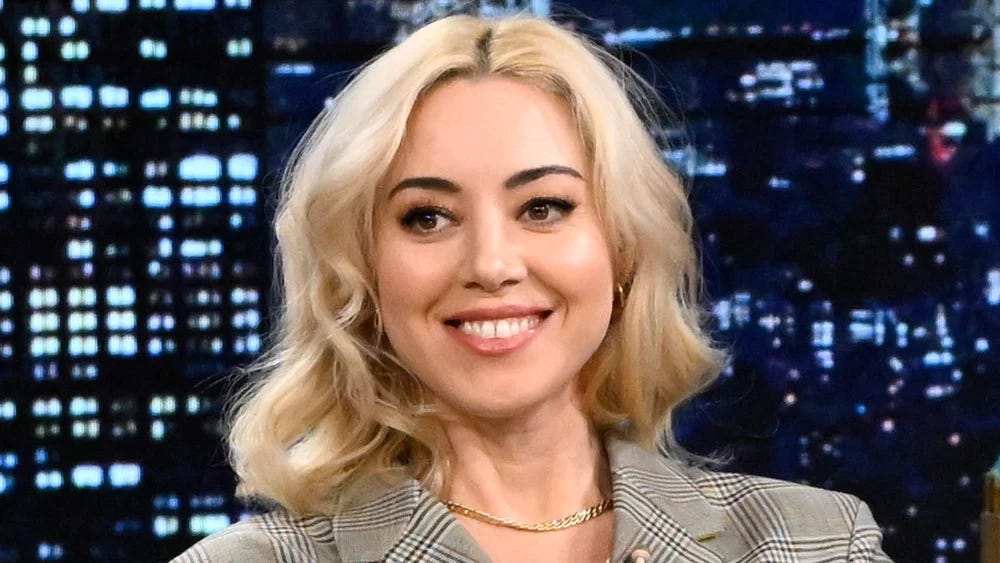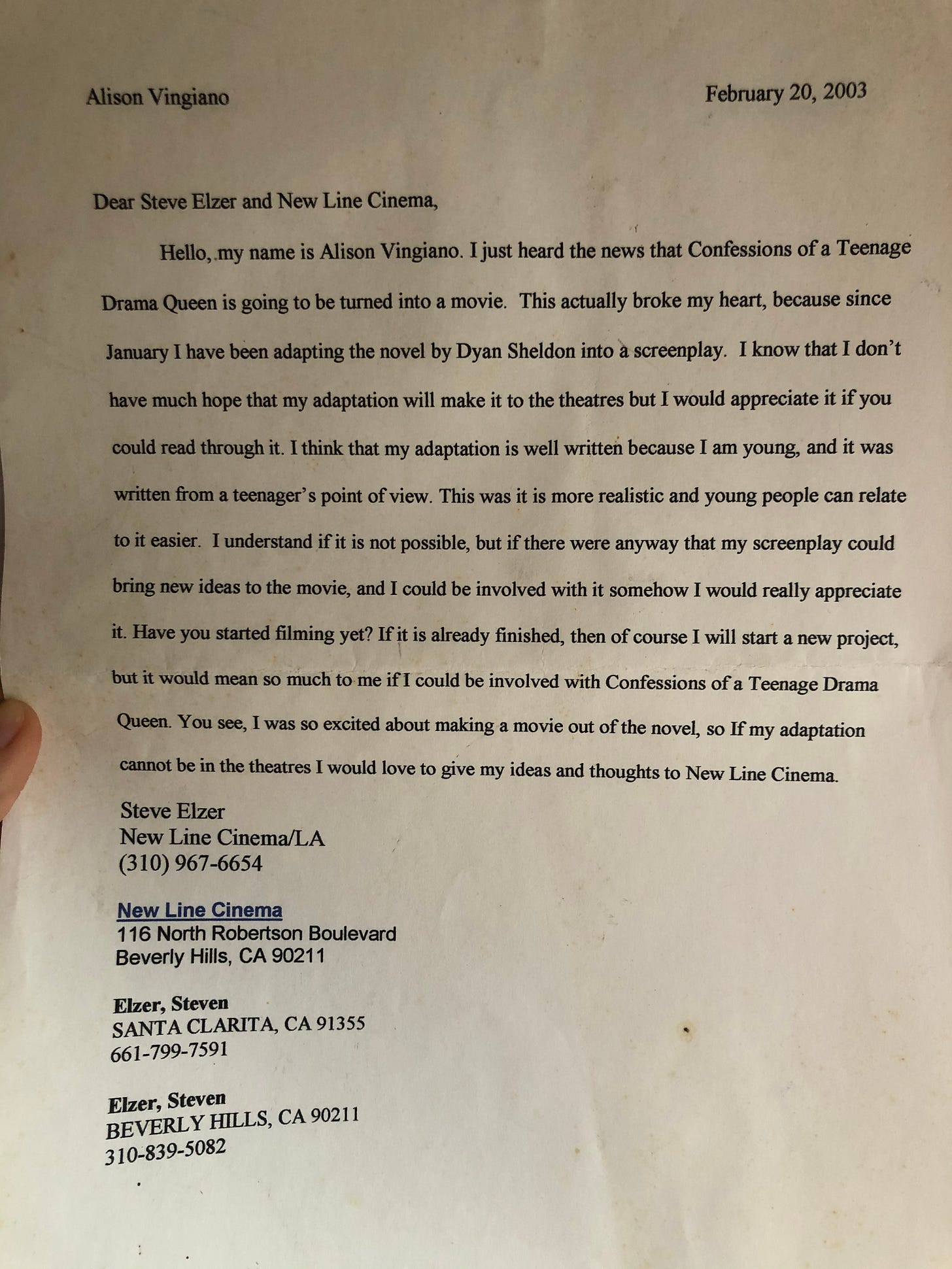The Secret to Success Is Delusion
"There's something about delusions that are really helpful when you want to do stuff that seems impossible," says Aubrey Plaza.
de·lu·sion (noun): a false belief or judgment about external reality, held despite incontrovertible evidence to the contrary, occurring especially in mental conditions.
Delusion can be a serious mental condition and my use of the term is not intended to make light of that. The definition I’m using of delusion in this piece is: “a belief or judgment about external reality, held despite incontrovertible evidence to the contrary.” In other words, when you believe something will happen despite evidence that it is very unlikely.
At some point in our lives, we knew we were great. We felt called to create from inside our bones. The whole world was in front of us, and we could be anybody we wanted to be when we grew up. Then, we grew up.
We wondered if we were good enough, if we’d ever make it, if it was too late. Our childish hope morphed into doubt. We saw success find other people, forgetting us.
At a recent dinner with some writers, my friend Alice declared we all needed more delusion in all our lives. She had recently stumbled upon an interview with Aubrey Plaza in which she explained that as a child, she desperately desired fame. You’d think Aubrey Plaza accidentally stumbled onto the Parks & Recreation set and got cast having never pursued acting for a moment of her life. But as it turns out, she is a delusional dreamer like the rest of us.
Here’s the quote, via Marie Claire, explaining how at age 14, Plaza begged her mom to take her to NYC to audition for an open casting call at Madison Square Garden:
"I had no chance of getting a part—I mean, no chance in the world. An open casting at Madison Square Garden? But I guess it just reminds me of how delusional I was at a young age, that I really believed I had a shot. But there's something about delusions that are really helpful when you want to do stuff that seems impossible," she says now, in retrospect.
"I think there's something about the energy of believing that something is real, about putting that energy out in the world. I didn't grow up in Hollywood, but from a young age I just believed it would happen."
Aubrey Plaza just believed it would happen, and it did. In other words, she visualized it, and manifested it into being.
Often times visualizations don’t work because we don’t wholeheartedly believe our lofty dreams will come true. When doubt, judgment, and self-hate seep in, you can’t access the energy to propel a visualization into reality. But when we’re young, we genuinely believe we have a shot at our dreams coming true. That energy absolutely helps brings them to fruition.
After discussing the Aubrey Plaza quote, Alice encouraged us to all go around stating our most delusional dreams for the next year or two. As a kid, I dreamt as big as Aubrey. As a 30-something… it had vanished. I struggled to form my big dreams for the next year, and when it came time for me to share them with my friends, I found realism prevailing. It was a lot of: “Well, I want to sell this show, but right now the market is really particular and [yada yada] and the WGA might strike, which means [excuse excuse].”
I couldn’t access the joy of endless possibility, of dreaming, of fantasizing.
Growing up, I knew I’d be a writer with unwavering certainty. Here is an example of my own delusion: When I was 13, I wrote a screenplay adaptation of the book Confessions of A Teenage Drama Queen, and sent it to New Line Cinema hoping that they would hire me as the youngest ever screenwriter.
I posted this on my Instagram, and my friend,
of , messaged me to say that he KNEW Steven Elzer from his days as an entertainment reporter... And he sent this letter to Steve! When I was 13, it was absurd to think he'd read my script. But I grew up to create a life where he was a quick email away. Steve saw the letter and commented on my post. I'd like to think my child self healed a little bit that day.I don’t have the life I dreamed about at 13 — there were lots of other high hopes I never doubted (I made a bet with my friend Jess that I would meet one of the cast members of Harry Potter by the time I was 20. I’m still waiting on this one. Tom Felton, if you’re reading this, I just finished your memoir and it’s great, email me aliv@substack.com.) But had I not been such a delusional dreamer as a kid, there’s no way I’d be anywhere near Hollywood today.
The truth is that if we want traditional forms of success in a creative career — to publish that book, star in that movie, sell that script — we must fight to access the genuine belief in ourselves that first brought us to seek it. We must connect with our child self, love her, and ask her to not to doubt the reality she dreams of.
When we lose access to believing wholeheartedly that we will “make it,” we lose our ability to dream with meaning — in other words, to manifest. We cannot create the lives we want unless we hold onto an undying certainty that the future we dream of is waiting for us.
We must be Jim Carey, not as a child, but as a twenty-something. With every ounce of love in my heart, here’s how fucking delusional Jim Carrey was: Jim Carey would drive up to Mulholland Drive and visualize himself becoming famous. He even wrote himself a paycheck for 10 million dollars and gave himself 3-5 years to bring that to fruition. Within that time frame, he made 10 million dollars on a singular movie: Dumb & Dumber.
IMPOSTER SYNDROME IS OUT, AND DELUSIONS OF GRANDEUR ARE IN
We spent years as a culture embracing and exploring the idea of imposter syndrome. But that time is OVER. You know you’re good, so admit you’re good. YOU’RE GOOD.
Take Quinta Brunson’s Cosmopolitan interview. The reporter wrote:
You once said you’ve never suffered from impostor syndrome and you feel very good at what you do. You added that if anything, your life is probably harder because you “refuse to pretend” that you’re not good.
I couldn’t find a link to the original quote the reporter referenced, but I knew Quinta when we worked together at BuzzFeed (and… made great art together), and I can confirm the above. Quinta is good at what she does and never doubted that she deserved a platform for her voice and vision. During our 20s it felt like she was simply waiting for the moment in which her inevitable future would meet up with her. She didn’t seem eager or desperate for fame. More like she’d accepted the reality of it and knew it would be there soon to change her life. Might as well enjoy the moment.
So how do you keep this excited energy when you’re in your 30s or 40s or beyond, and life isn’t what you expected?
Find a way to connect to that inner power, the inner child who simply knew it would happen. When you feel doubt, calm yourself down with deep breathing and find the dreamer you once were — there’s always a low point before you pop off, right?
Rewrite your story so that your perceived failures and struggles are an essential part of the journey to eventually reaching your goals. See them as possible and close.
State affirmations in the mirror. Say them out loud to yourself until you believe that they are true.
Just because something is unlikely does not mean it can’t happen. Access that truth until you feel it in your body.
Do think Emma Stone performed on VH1’s “In Search Of The Partridge Family” competition and thought “sure, I’m just singing on a reality TV show right now, but watch out America, soon I’m gonna be one of the most famous actors of my generation and win an Oscar.” I do, 100 fucking percent.
You are good enough. It doesn’t matter where you are now. There is no reason why it won’t be you.
Join my next Script Anatomy class:
TV Pilot Drama Lab
Tuesdays, Mar 21, 2023 – May 16, 2023, 6:00-10:00pm PST (virtual)
Take a concept to a finished draft in 6 weeks, with 2 weeks of prep work beforehand. You’ll write both an outline AND a completed draft in this course. It moves at a professional pace and operates like a writer’s room. Drama/dramedy writers only. $855.










